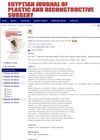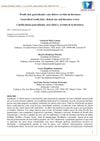 February 2024 in “World journal of stem cells”
February 2024 in “World journal of stem cells” Adipose-derived stem cells can help repair and improve eye tissues and appearance.
January 2024 in “Medicina” Proper planning and technique in upper-face feminization surgery are crucial to avoid complications and revisions.
 January 2024 in “Current research in toxicology”
January 2024 in “Current research in toxicology” Thallium is highly toxic, causing severe health issues, and Prussian blue is the best antidote.
 January 2024 in “The journal of investigative dermatology/Journal of investigative dermatology”
January 2024 in “The journal of investigative dermatology/Journal of investigative dermatology” AP-2α and AP-2β are crucial for healthy skin and hair.
 December 2023 in “Aggregate”
December 2023 in “Aggregate” Scientists are using clumps of special stem cells to improve organ repair.
 October 2023 in “Psychiatry research. Case reports”
October 2023 in “Psychiatry research. Case reports” A new HRAS gene variant may cause a range of symptoms including intellectual disability and psychiatric issues.
 October 2023 in “Indian journal of ophthalmology. Case reports”
October 2023 in “Indian journal of ophthalmology. Case reports” A woman lost vision in one eye after a forehead injection, but prompt treatment led to partial vision recovery.
 September 2023 in “Chinese Medical Journal”
September 2023 in “Chinese Medical Journal” Robotic surgical systems are being used more in plastic and reconstructive surgery due to their precision and control, improving patient outcomes and satisfaction, despite challenges like high costs.
 August 2023 in “Bioengineering”
August 2023 in “Bioengineering” Bioprinting could greatly improve health outcomes but faces challenges like material choice and ensuring long-term survival of printed tissues.
 July 2023 in “Developmental medicine and child neurology/Developmental medicine & child neurology”
July 2023 in “Developmental medicine and child neurology/Developmental medicine & child neurology” DFMO treatment improves hair growth, muscle tone, and development in Bachmann-Bupp syndrome patients.
 June 2023 in “Frontiers in Bioengineering and Biotechnology”
June 2023 in “Frontiers in Bioengineering and Biotechnology” The conclusion is that accurately replicating the complexity of the extracellular matrix in the lab is crucial for creating realistic human tissue models.
 May 2023 in “Aesthetic Plastic Surgery”
May 2023 in “Aesthetic Plastic Surgery” The document concludes that there are various surgical techniques for hair restoration, their success depends on the surgeon's skill, patient's health, and quality of donor hair, and they can potentially improve the mental well-being of those with hair loss.
 April 2023 in “Dentistry”
April 2023 in “Dentistry” Baby teeth stem cells can potentially grow organs and treat diseases.
 April 2023 in “Authorea (Authorea)”
April 2023 in “Authorea (Authorea)” Hair transplantation can improve scars after removing a rare skin cancer.
January 2023 in “Springer eBooks”  December 2022 in “IntechOpen eBooks”
December 2022 in “IntechOpen eBooks” Forensic DNA Phenotyping accurately predicts physical traits and is used in investigations, but needs more diverse population data for confirmation.
 April 2020 in “The Egyptian Journal of Plastic and Reconstructive Surgery”
April 2020 in “The Egyptian Journal of Plastic and Reconstructive Surgery” Both follicular unit extraction and scalp expanders effectively treat secondary cicatricial alopecia, with scalp expanders leading to quicker and denser hair growth.
 August 2015 in “Europe PMC (PubMed Central)”
August 2015 in “Europe PMC (PubMed Central)” Using body measurements can help achieve good results in plastic surgery like reshaping the torso, but it doesn't work for all body types.
April 2007 in “CRC Press eBooks” Certain vitamins in wrong amounts, alcohol abuse, metals, and other toxins can cause serious brain and nerve damage.
 June 1998 in “Plastic and Reconstructive Surgery”
June 1998 in “Plastic and Reconstructive Surgery” Facial proportion is important in hair restoration surgery.
October 2022 in “International Journal of Molecular Sciences” Fish collagen peptides can significantly promote hair growth.
 April 2023 in “Journal of Investigative Dermatology”
April 2023 in “Journal of Investigative Dermatology” Ectomesenchyme is a key source of skin stem cells.
 14 citations,
January 2018 in “Endocrine”
14 citations,
January 2018 in “Endocrine” Cantú syndrome may be linked to pituitary adenomas.
 53 citations,
October 1993 in “Drug Safety”
53 citations,
October 1993 in “Drug Safety” Oral retinoids can cause side effects ranging from mild to severe, including birth defects, and require careful monitoring and contraception.
 24 citations,
June 2010 in “Clinics in Dermatology”
24 citations,
June 2010 in “Clinics in Dermatology” Taking too many vitamin and mineral supplements can cause serious health problems.
 11 citations,
January 2016 in “Bipolar Disorder”
11 citations,
January 2016 in “Bipolar Disorder” Valproate is a mood stabilizer for bipolar disorder but has side effects and risks, especially during pregnancy.
 4 citations,
August 2005 in “Archives of Dermatological Research”
4 citations,
August 2005 in “Archives of Dermatological Research” Higher p63 and CD34 levels found in specific scalp areas may affect hair loss progression.

research Acne
2 citations,
May 2011 in “Harper's Textbook of Pediatric Dermatology” Acne is a common skin condition linked to diet, hormones, and genetics, and early treatment can prevent scarring.
 July 2024 in “Journal Archives of Health”
July 2024 in “Journal Archives of Health” Woolly hair is a rare genetic condition with no effective treatments.
5 citations,
March 2016 in “Experimental and molecular pathology” Mice with alopecia areata had wider lymphatic vessels in their skin.

























